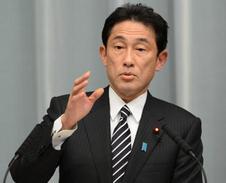 Source: headlines.yahoo.co.jp
Source: headlines.yahoo.co.jp This news was accompanied by a report in the Sankei Shimbun on Wednesday that revealed that a Chinese military surveillance plane had repeatedly flown close to airspace over the Senkaku Islands in September of last year (shortly after the Noda government had announced its plan to nationalise the islands) (J). In relation to incursions, another report in the Yomiuri Shimbun on Monday stated that Chinese maritime authority vessels had again entered Japanese territorial waters around the Senkaku Islands, prompting newly appointed Defence Minister Onodera to contact his US counterpart and reiterate the solidarity of both nations on the issue of control over the islands (J). In the midst of almost daily updates on increased tensions between China and Japan, the Guardian made note that both China and Japan have both sought to upgrade their drone (UAV) capabilities, with Japan making overtures to the US in order to acquire at least 4 Global Hawk aircraft to monitor its maritime borders in the Ryukyu Island chain (E) thereby increasing the risk of a drone conflict near the Senkaku Islands.
Not to be outdone in the activity stakes, newly appointed Foreign Minister Kishida Fumio announced on Tuesday that he would be embarking on a tour of Asia-Pacific nations to discuss economic and security issues with the Philippines, Singapore, Brunei, and Australia (J). Given the fact that three of these nations are currently involved in TPP negotiations, Foreign Minister Kishida may indeed be carrying a message on behalf of the Abe government that will provide some further indication on whether Japan plans to join the TPP (although given the fact that those nations already involved in negotiations could possibly reach a conclusion to those negotiations by October this year (E), Japan has definitely left it very late to signal any resolution to join the partnership. That being said, no economic gathering would refuse to admit Japan as a member, however it might object if Japan attempted to make new demands regarding tariffs, market access, and intellectual property rights).
So what we have here is the potential for greater escalation in tension between Japan and China, with neither side conceding any ground and indeed announcing their claims using language that makes it clear that they are not willing to discuss their territorial concerns. In his visit to Australia on Sunday, in addition to his economic agenda, Foreign Minister Kishida may also try to extract from Australia some form of understanding on Japan’s territorial position and the need for closer security ties (on the latter he is likely to be rewarded, but given that Australia has no position on territorial disputes between other nations other than to emphasise the need for a collective code of conduct, he is likely to be disappointed in the Australian response – on this point see this article by Rick Wallace of the Australian, although be warned the article is behind a firewall – E).
Given the stance that the Abe government has taken on territorial issues, its decision to begin talks with the incoming Park government of South Korea augurs well for further dialogue concerning Takeshima, however just how successfully such talks are negotiated will have long-term consequences for Park-Abe relations and the ability of both sides to transcend their aversions to one another. Since other missions to the US, Europe and Russia planned for this month are also aimed at the resolution of existing issues, the formation of new ties, the signing of agreements, and further dialogue, the Abe government is going all out in its efforts to dispel the uncertainties of the DPJ era and give a clear indication of where Japan stands in its foreign relations and what other nations can expect from the second Abe Cabinet.
In the case of Australia, given Abe Shinzo’s personal interest in improving relations with Australia and emphasising defence and economic ties between both nations, it is entirely likely that this year will see an increase in bilateral talks and visits between ministers and senior bureaucrats in order to lay the groundwork for future cooperation. After all, it was Abe Shinzo’s grandfather who approached Australia in the 1950s to restore relations and implement fifty years of economic cooperation, and Abe is nothing if not determined to either equal or surpass his grandfather’s legacy in shaping Japan’s destiny for the next sixty years. Whether he succeeds or not depends upon his own abilities (which are not great), but if he does manage to re-invigorate Japan’s diplomatic machinery, defensive posture, and economic fortunes, then he will secure a more favourable legacy than that of the LDP’s last poster boy, Koizumi Junichiro.
 RSS Feed
RSS Feed